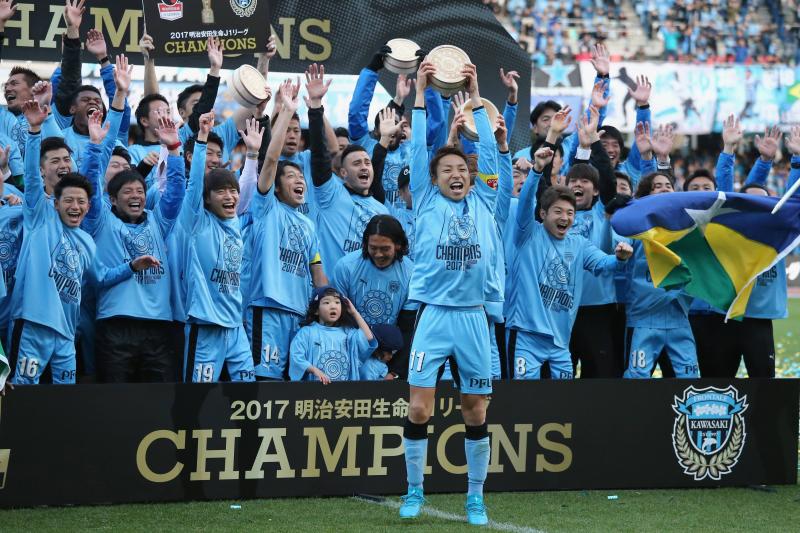
Through its first 33 rounds, the MEIJI YASUDA J1 League had seven different leaders. Defending champions Kashima Antlers dominated the second half of the season, having stood on top of the table since Week 21. The Ibaraki side had an eight point lead with seven matches remaining and could have clinched the title with two games to spare.
Uncharacteristically, Japan’s biggest trophy collectors let the chance slip through its fingers. Just one victory in either of the last two matches would have been enough to secure their ninth J1 title. However, the team which had recorded just a single draw thus far in the season could not do better than two scoreless stalemates in their final two games.
Kawasaki Frontale, who spent the year as dark horses, found their best form in the home stretch. Backed by a 15-game unbeaten run, finished the week in first place for the first time all season. Fortunately for them, it was the campaign’s final round.
The Todoroki Stadium residents fought for their lives in the last few rounds, knowing that a single stumble would concede the title to Kashima. On the last day they needed another three points to keep their come-from-behind title hopes alive. The team did their part from the opening, scoring against an already-relegated Omiya Ardija in the first minute. Another goal before halftime and three more in the second half sent the Squirrels to the bottom of the table with a 5-0 thrashing. But many kilometres away in Shizuoka, Kashima needed just one goal to bring the schale home. The match against Jubilo Iwata, who were fighting at home for fourth place and an outside shot at the AFC Champions League, was tense until the final whistle.
Despite a first half favourable to Jubilo, Kashima dominated the second half and created many clear chances. The J1 title was at Yukitoshi Ito’s feet as he got the ball completely unmarked inside the box, only to see his attempt saved by Jubilo goalkeeper Krzysztof Kaminski. Mu Kanazaki had his own chance after diverting a cross in front of the Polish goalkeeper, but the ball did not find its target. Leandro took his turn after beating the defender inside the box, but finished over the crossbar. Finally Shuto Yamamoto took his chance unmarked on the far post, but his header could not find the net. The crowd at Yamaha Stadium witnessed some wild final minutes as both teams exchanged counters looking for a decisive goal. No one scored and the trophy, which was waiting to be lifted, would be quietly returned to its case for transport to Kawasaki.
The top two clubs finished level on 72 points, but Kawasaki Frontale took advantage of a better goal difference – 39 to Kashima’s 22. In case any doubts linger, it’s worth remembering that Kawasaki destroyed Kashima in their head-to-head clashes, winning 3-0 at Kashima Stadium and 3-1 at home. Both sides nevertheless mounted title-worthy campaigns, especially considering that the previous 10 seasons of one-stage championships saw six winners end with less than 70 points.
Kawasaki finally overcame their trauma of always finishing as runners-up, doing it against their bitter nemesis. The Kanagawa side had three previous runners-up finishes in the J1 (2006, 2008 and 2009), in addition to four silver medals in the J.League Cup (2000, 2007, 2009 and 2017) and another in last year’s Emperor’s Cup. It’s almost fitting that the club’s first-ever major trophy came as a result of perhaps the most difficult-to-realize scenario, dependent on so many other results. But without anything to lose, the team lived up to their potential and fought hard until the end. Kashima, with all the pressure on their shoulders, succumbed.
In his first year as a manager, Kawasaki’s Toru Oniki succeeded in evolving previous skipper Yahiro Kazama’s style into a more balanced game. Frontale still play beautiful and offensive football, but do not let their defence become as exposed as before The team had the best offense in the league with 71 goals scored, the third-best defence with 31 allowed, and the top scorer and likely league MVP in Yu Kobayashi.
The 30-year-old rejected a transfer to Gamba Osaka last year, where he would have earned an a higher salary, to become Kawasaki’s new captain and earn a come-from-behind title of his owner. With his hat-trick in Saturday’s final round, he reached a total of 23 goals, surpassing Cerezo Osaka’s Kenyu Sugimoto (22) and Urawa Reds’ Shinzo Koroki (20) to win the league’s golden boot.
“Winning titles for another club would have no meaning to me”, Kobayashi wrote on his blog one year ago. Now he has fulfilled the dreams of the Frontale fans and carved his name once and for all as a legend in Japanese football.
Tiago Bontempo is a Brazilian journalist specializing in Japanese football for Globo. He can be found on Twitter at @GunnerTNB

